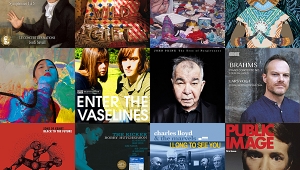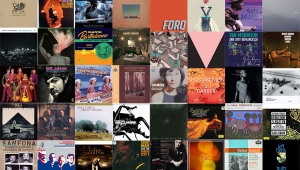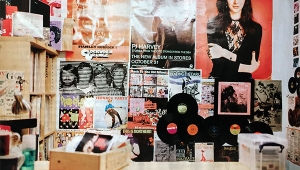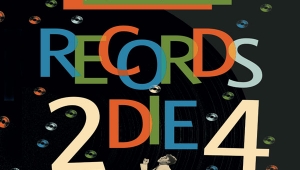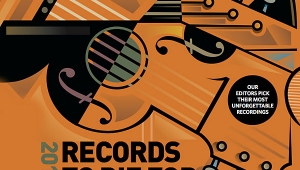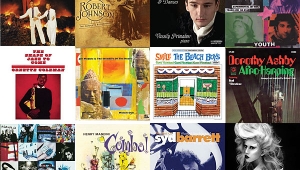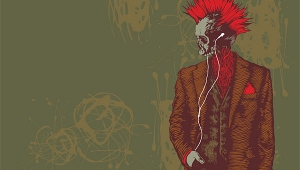| Columns Retired Columns & Blogs |
2004 Records To Die For Page 6
PAUL MESSENGER
THE WHITE STRIPES: Elephant
XL Recordings XLCD 162 (CD), XLLP 162 (LP). 2003. Jack White, prod.; Liam Watson, eng. AAD? TT: 49:56
Arguably the most exciting R&B disc since Nirvana's Nevermind, Elephant is the creation of Detroit brother-sister duo Jack and Meg White, who came to England to make the recording at Liam Watson's Toe Rag studios in Hackney, in London's East End. Defiantly anti-tech, Liam's studio deliberately uses "vintage" analog equipment from the 1960s and 1970s, which probably explains its rather "vintage" colorations as well its admirably direct musical communication.
LAMBCHOP: Is a Woman
City Slang 20190-2 (CD), 20190-1 (LP). 2002. Mark Nevers, prod., eng.; Kurt Wagner, prod.; Mark Lacuesta, eng. AAD. TT: 61:39
I've played this recording over and over again since seeing Lambchop live in 2002, and this beautifully relaxed and laid-back music remains remarkably fresh and involving. The band comes from Nashville, but the music isn't country. It isn't jazz or rock, either, though there are echoes of all three. There was even a hint of orchestral influence in the way this 15-strong combo performed on stage.
T. REX: The Slider
Chronicles 314 534 355-2 (CD). 1972. Tony Visconti, prod. AAD? TT: 53:46
T. Rex and Marc Bolan have been mostly consigned to the Eurotrashbin of history, but that's mostly a mistake. Bolan could cut a three-chord, three-minute pop single with the best of 'em, whirling together throbbing hormonal grooves, fuzzed guitar, and cosmic-hippie-nursery-rhyme lyrical gibberish. "Metal Guru" opens the album with Bolan's signature buoyancy: it's all hook, surrounded by distorted guitar stomp and a wall of backup singers layered over handclaps and percussion. The nearly irresistible formula is reworked throughout the album; a sparkling, winking, laughing collection reflecting the best of the man who was the finest glam rock had to offer.
GUY CLARK: Keepers
Sugar Hill SHCD-1055 (CD). 1997. Guy Clark, prod.; Miles Wilkinson, prod., eng. AAD? TT: 64:36
Listening to Keepers is like sitting down with an old friend wearing old boots and old jeans, telling old stories. That's pretty much what Guy Clark does and is on the live Keepers. "This is a song about a man who was kind of like my grandfather," Clark says in that comfy growl of his, introducing "Desperados Waiting for a Train." "Actually, he was my grandmother's boyfriend is what he was." Though that song has been on virtually every album Clark has released, it's never been more heartfelt or powerful than it is in front of the small audience who sat in on this show in Nashville. Clark seems to ache and soar as he and his crackerjack five-piece band tell the story of an old, dying man.
MIAMI SOUND: Rare Funk & Soul from Miami, Florida, 1967-1974
Various Artists Soul Jazz SJR CD72 (CD). 2003. Stuart Baker, compiler; Duncan Cowell, Pete Reilly, mastering. AAD. TT: 49:55
TK Records, with its in-house songwriters, producers, and musicians, was a Miami funk-soul hit-making machine comparable, in its time, to Motown and Stax/Volt. This 17-song compilation, courtesy Britain's Soul Jazz label, brings that southern sound back to life. Included are familiar artists such as Timmy Thomas ("Funky Me"), George McCrae ("Get Lifted"), and his wife, Gwen ("90% of Me Is You"—she later had a massive disco hit, "Rock Your Baby"). But lesser-knowns also fuel this set. Check out Willie "Little Beaver" Hale's slippery "Funkadelic Sound," or Clarence Reid's swamp-funk strut, "Cadillac Annie." Included is a 20-page booklet loaded with artists' bios—did you know that Reid was also X-rated comedian Blowfly? Don't worry, parents, you won't find "Too Fat to F**k" or "Girl Let Me C*m in Your Mouth" here. And anyway, these funk grooves are seriously stankified!
THE RAMONES: Road to Ruin
Warner Archives/Rhino R2 74308 (CD). 2001. T. Erdelyi, Ed Stasium, prods., engs.; Bill Inglot, Gary Stewart, reissue prods. AAD. TT: 52:10
In 1978 I got my copy of the Ramones' fourth album, Road to Ruin, autographed by the punk kingpins. I recall breathlessly informing the members how I'd memorized every song, from opening napalm blast "I Just Want to Have Something to Do" to punkabilly throbber "I Wanna Be Sedated" to a cover of "Needles & Pins." But, y'know, that was then and this is now. Joey and Dee Dee Ramone are pushing up daisies, the band is history, and I just started eBaying. Bids on my signed LP are nearing the $300 mark, and God created expanded and remastered CD reissues to give record collectors a break while planning their kids' college funds. Me, sentimental? Gabba gabba hah!
WILCO: Summer Teeth
Reprise 47282-2 (CD). 1999. Wilco, prods.; Larry Greenhill, Mark Hagler, Dave Trumfio, Russ Long, Mitch Easter, engs.; Bob Ludwig, mastering. AAD? TT: 60:17
Sandwiched between the we're-not-alt-country-anymore ambition of Being There and the convoluted commercial hit that Yankee Hotel Foxtrot became, Summer Teeth is often given short shrift, even by Wilco fans. That's a shame because, song for song, these 16 tracks stand among the band's best. Great twisted pop melodies and consistently inventive arrangements offer a deceptively seductive surface. Listen a little closer, though, and Jeff Tweedy's lyrics betray tales as dark as the winter wind off Lake Michigan is cold. It's hard to say why an album this sonically appealing stiffed—it's Wilco's worst-selling release—but if you look past the smoke surrounding Wilco's subsequent battles with Reprise, Summer Teeth may ultimately stand as the band's truest masterpiece. (XXII-4)
SOLOMON BURKE: Don't Give Up on Me
Fat Possum 80358-2 (CD). 2002. Joe Henry, prod.; S. Husky Hüskulds, eng.; Doug Sax, mastering. AAD? TT: 51:34
It's almost unheard of for a singer to reach his peak nearly half a century into his career, but that's precisely the case with this album from the self-appointed King of Rock and Soul. It would be easy to give too much credit to the all-star collection of songwriters—Tom Waits, Van Morrison, Bob Dylan, Brian Wilson, Elvis Costello—but it's Joe Henry's subtle, sympathetic production; a crack studio band consisting of guitar, bass, drums, piano, and organ; and Burke's still remarkable voice, that carry this disc. While all 11 songs feature wonderful performances, the album ends with an amazing trifecta: the countrified soul of Nick Lowe's "Other Side of the Coin," the righteous anger of Mann-Weill's "None of Us Are Free," and the heavenly heartbreak of "Sit This One Out." (XXVI-1)
MARC RIBOT: Marc Ribot y los Cubanos Postizos (The Prosthetic Cubans)
Marc Ribot, guitar, trumpet, vocals; Gregory Ribot, baritone saxophone; John Medeski, Anthony Coleman, organ; Brad Jones, bass; Robert J. Rodriguez, drums, claves, chekere, percussion, background vocals; E.J. Rodriguez, percussion, background vocals
Atlantic 83116-2 (CD). 1998. J.D. Foster, prod.; Andy Taub, eng. AAD. TT: 46:47
The proof is in the fun. That's what makes East Village guitarist Marc Ribot's spin on music by and associated with Cuban son maestro Arsenio Rodríguez so appealing. Sans pretense or artifice, Ribot reverently stays true to the essence of Rodríguez's syncopated and melodically rich Afro-Cuban vibe while approaching the tunes with serrated rock, cool-pop noir, and soul-jazz sensibilities. The band plays with gleeful ease, and even erupts into percussive free-for-alls during such rollicking numbers as "Como se Goza en el Barri" and "Choserito Plena." The guitar takes center stage throughout as Ribot ranges from playing soft and lyrical lines on the romantic "Aurora en Pekín" to jagged-edge runs on the sizzling "Postizo," the leader's original that pays homage to the spirit of Rodríguez's music. (XXII-2)
BRUCE COCKBURN: Humans: Deluxe Edition
Rounder 11661-3210-2 (CD). 1980/2003. Eugene Martynec, prod.; Gary Gray, eng.; Peter J. Moore, digital remastering. AAD. TT: 49:39
A life-changing personal catastrophe fuels transcendent art. That's what happened in the late 1970s when Canadian folk troubadour Bruce Cockburn faced the falling apart of his 10-year marriage. Nearly overnight, the singer-songwriter transformed from a virtuoso acoustic guitarist with a mystical worldview into a keen—and sometimes angry, sometimes hopeful—observer of grim societal ills. He moved to Toronto from the north woods, gleaned lessons from Bergman's The Seventh Seal, and poetically mused on "the fascist architecture of my own design / too long keeping my love confined." The acoustic guitar still rings true, but Cockburn also plugs in, to upbeat and riveting effect. As articulated in the reggae-tinged "Rumours of Glory," throughout the disc he reflects on "the extremes of what humans can be," and in the process poses vital questions on the state of the human heart. Humans is the pivotal album of Cockburn's long and, in stretches, stellar career.
DAVID LANG: the passing measures
Marty Erhlich, bass clarinet; Birmingham Contemporary Music Group, City of Birmingham Symphony Orchestra Chorus; Paul Herbert, conductor
Cantaloupe Music CA21003 (CD). 2001. David Lang, prod.; David Sparrow, eng. DDD. TT: 42:15
The painfully slow the passing measures drones along like a 42-minute sigh—an allusion, perhaps, to the tedium of life lived minute to minute. Sounds oppressive, but, like Satie's musique d'ameublement, it seems designed to inhabit a room rather than engage the listener's full attention. Yet its warmth and pulse can create transcendent epiphanies as profound as any by Bruckner or Mahler. Marty Ehrlich (featured on Jerome Harris's Rendezvous, Stereophile STPH013-2) solos on bass clarinet, and it is his breathy hoot rather than the seemingly disembodied chorus that gives this disc its voice, which is as direct and intimate as a whisper.
TOM RUSSELL: Borderland
Hightone HCD8132 (CD). 2001. Gurf Morlix, prod. DDD. TT: 49:40
Tom Russell writes songs that leave out all the stuff you wouldn't listen to anyway. They're stark and powerfully beautiful, just like his beloved Southwest. But while his stories play out in the states that share boundaries with Mexico, his real subject is the borderland between men and women. On Borderland, Russell gets an assist from ace producer Gorf Morlix (who has also made Lucinda Williams and Robert Earl Keen sound mighty fine) and a crack band that includes Joel Guzman on accordion. Good as the whole package is, it's the songs that'll make you gasp with their honesty and sharp detail. If poet Richard Lehnert played guitar, these are the songs he'd write.
THE WHITE STRIPES: Elephant
XL Recordings XLCD 162 (CD), XLLP 162 (LP). 2003. Jack White, prod.; Liam Watson, eng. AAD? TT: 49:56
Arguably the most exciting R&B disc since Nirvana's Nevermind, Elephant is the creation of Detroit brother-sister duo Jack and Meg White, who came to England to make the recording at Liam Watson's Toe Rag studios in Hackney, in London's East End. Defiantly anti-tech, Liam's studio deliberately uses "vintage" analog equipment from the 1960s and 1970s, which probably explains its rather "vintage" colorations as well its admirably direct musical communication.
There's deliberate distortion aplenty in the more aggressive sections, but many tracks are very delicate and genuinely lyrical. Jack shows remarkable songwriting maturity and versatility, from the hard-rocking hit "Seven Nation Army" to the poignant "In the Cold Cold Light" via the delightfully schizoid "Little Acorns." An outstanding version of Bacharach-David's classic "I Just Don't Know What to Do with Myself" alone is worth the purchase price. I preferred the CD; the vinyl pressing quality is dodgy.
LAMBCHOP: Is a Woman
City Slang 20190-2 (CD), 20190-1 (LP). 2002. Mark Nevers, prod., eng.; Kurt Wagner, prod.; Mark Lacuesta, eng. AAD. TT: 61:39
I've played this recording over and over again since seeing Lambchop live in 2002, and this beautifully relaxed and laid-back music remains remarkably fresh and involving. The band comes from Nashville, but the music isn't country. It isn't jazz or rock, either, though there are echoes of all three. There was even a hint of orchestral influence in the way this 15-strong combo performed on stage.
The heart of the band is singer-songwriter Kurt Wagner, who sits down on stage (his knees are shot after a lifetime working as a carpet fitter) to deliver his archly quirky, thought-provoking, witty lyrics with great phrasing and a lovely warm tonality. The recording is very classy too, erring a little on the rich and heavy side of neutrality.
MICHAEL METZGER
T. REX: The Slider
Chronicles 314 534 355-2 (CD). 1972. Tony Visconti, prod. AAD? TT: 53:46
T. Rex and Marc Bolan have been mostly consigned to the Eurotrashbin of history, but that's mostly a mistake. Bolan could cut a three-chord, three-minute pop single with the best of 'em, whirling together throbbing hormonal grooves, fuzzed guitar, and cosmic-hippie-nursery-rhyme lyrical gibberish. "Metal Guru" opens the album with Bolan's signature buoyancy: it's all hook, surrounded by distorted guitar stomp and a wall of backup singers layered over handclaps and percussion. The nearly irresistible formula is reworked throughout the album; a sparkling, winking, laughing collection reflecting the best of the man who was the finest glam rock had to offer.
GUY CLARK: Keepers
Sugar Hill SHCD-1055 (CD). 1997. Guy Clark, prod.; Miles Wilkinson, prod., eng. AAD? TT: 64:36
Listening to Keepers is like sitting down with an old friend wearing old boots and old jeans, telling old stories. That's pretty much what Guy Clark does and is on the live Keepers. "This is a song about a man who was kind of like my grandfather," Clark says in that comfy growl of his, introducing "Desperados Waiting for a Train." "Actually, he was my grandmother's boyfriend is what he was." Though that song has been on virtually every album Clark has released, it's never been more heartfelt or powerful than it is in front of the small audience who sat in on this show in Nashville. Clark seems to ache and soar as he and his crackerjack five-piece band tell the story of an old, dying man.
You'll be only too happy to ride along through a set that could be a greatest-hits collection, if the Texas storyteller had ever had a hit. Riveting, simply produced, exquisitely executed versions of "Homegrown Tomatoes," "L.A. Freeway," "She Ain't Goin' Nowhere," and others give a beautiful, accurate portrait of the power Clark has in person. (XX-6)
FRED MILLS
MIAMI SOUND: Rare Funk & Soul from Miami, Florida, 1967-1974
Various Artists Soul Jazz SJR CD72 (CD). 2003. Stuart Baker, compiler; Duncan Cowell, Pete Reilly, mastering. AAD. TT: 49:55
TK Records, with its in-house songwriters, producers, and musicians, was a Miami funk-soul hit-making machine comparable, in its time, to Motown and Stax/Volt. This 17-song compilation, courtesy Britain's Soul Jazz label, brings that southern sound back to life. Included are familiar artists such as Timmy Thomas ("Funky Me"), George McCrae ("Get Lifted"), and his wife, Gwen ("90% of Me Is You"—she later had a massive disco hit, "Rock Your Baby"). But lesser-knowns also fuel this set. Check out Willie "Little Beaver" Hale's slippery "Funkadelic Sound," or Clarence Reid's swamp-funk strut, "Cadillac Annie." Included is a 20-page booklet loaded with artists' bios—did you know that Reid was also X-rated comedian Blowfly? Don't worry, parents, you won't find "Too Fat to F**k" or "Girl Let Me C*m in Your Mouth" here. And anyway, these funk grooves are seriously stankified!
THE RAMONES: Road to Ruin
Warner Archives/Rhino R2 74308 (CD). 2001. T. Erdelyi, Ed Stasium, prods., engs.; Bill Inglot, Gary Stewart, reissue prods. AAD. TT: 52:10
In 1978 I got my copy of the Ramones' fourth album, Road to Ruin, autographed by the punk kingpins. I recall breathlessly informing the members how I'd memorized every song, from opening napalm blast "I Just Want to Have Something to Do" to punkabilly throbber "I Wanna Be Sedated" to a cover of "Needles & Pins." But, y'know, that was then and this is now. Joey and Dee Dee Ramone are pushing up daisies, the band is history, and I just started eBaying. Bids on my signed LP are nearing the $300 mark, and God created expanded and remastered CD reissues to give record collectors a break while planning their kids' college funds. Me, sentimental? Gabba gabba hah!
KEITH MOERER
WILCO: Summer Teeth
Reprise 47282-2 (CD). 1999. Wilco, prods.; Larry Greenhill, Mark Hagler, Dave Trumfio, Russ Long, Mitch Easter, engs.; Bob Ludwig, mastering. AAD? TT: 60:17
Sandwiched between the we're-not-alt-country-anymore ambition of Being There and the convoluted commercial hit that Yankee Hotel Foxtrot became, Summer Teeth is often given short shrift, even by Wilco fans. That's a shame because, song for song, these 16 tracks stand among the band's best. Great twisted pop melodies and consistently inventive arrangements offer a deceptively seductive surface. Listen a little closer, though, and Jeff Tweedy's lyrics betray tales as dark as the winter wind off Lake Michigan is cold. It's hard to say why an album this sonically appealing stiffed—it's Wilco's worst-selling release—but if you look past the smoke surrounding Wilco's subsequent battles with Reprise, Summer Teeth may ultimately stand as the band's truest masterpiece. (XXII-4)
SOLOMON BURKE: Don't Give Up on Me
Fat Possum 80358-2 (CD). 2002. Joe Henry, prod.; S. Husky Hüskulds, eng.; Doug Sax, mastering. AAD? TT: 51:34
It's almost unheard of for a singer to reach his peak nearly half a century into his career, but that's precisely the case with this album from the self-appointed King of Rock and Soul. It would be easy to give too much credit to the all-star collection of songwriters—Tom Waits, Van Morrison, Bob Dylan, Brian Wilson, Elvis Costello—but it's Joe Henry's subtle, sympathetic production; a crack studio band consisting of guitar, bass, drums, piano, and organ; and Burke's still remarkable voice, that carry this disc. While all 11 songs feature wonderful performances, the album ends with an amazing trifecta: the countrified soul of Nick Lowe's "Other Side of the Coin," the righteous anger of Mann-Weill's "None of Us Are Free," and the heavenly heartbreak of "Sit This One Out." (XXVI-1)
DAN OUELLETTE
MARC RIBOT: Marc Ribot y los Cubanos Postizos (The Prosthetic Cubans)
Marc Ribot, guitar, trumpet, vocals; Gregory Ribot, baritone saxophone; John Medeski, Anthony Coleman, organ; Brad Jones, bass; Robert J. Rodriguez, drums, claves, chekere, percussion, background vocals; E.J. Rodriguez, percussion, background vocals
Atlantic 83116-2 (CD). 1998. J.D. Foster, prod.; Andy Taub, eng. AAD. TT: 46:47
The proof is in the fun. That's what makes East Village guitarist Marc Ribot's spin on music by and associated with Cuban son maestro Arsenio Rodríguez so appealing. Sans pretense or artifice, Ribot reverently stays true to the essence of Rodríguez's syncopated and melodically rich Afro-Cuban vibe while approaching the tunes with serrated rock, cool-pop noir, and soul-jazz sensibilities. The band plays with gleeful ease, and even erupts into percussive free-for-alls during such rollicking numbers as "Como se Goza en el Barri" and "Choserito Plena." The guitar takes center stage throughout as Ribot ranges from playing soft and lyrical lines on the romantic "Aurora en Pekín" to jagged-edge runs on the sizzling "Postizo," the leader's original that pays homage to the spirit of Rodríguez's music. (XXII-2)
BRUCE COCKBURN: Humans: Deluxe Edition
Rounder 11661-3210-2 (CD). 1980/2003. Eugene Martynec, prod.; Gary Gray, eng.; Peter J. Moore, digital remastering. AAD. TT: 49:39
A life-changing personal catastrophe fuels transcendent art. That's what happened in the late 1970s when Canadian folk troubadour Bruce Cockburn faced the falling apart of his 10-year marriage. Nearly overnight, the singer-songwriter transformed from a virtuoso acoustic guitarist with a mystical worldview into a keen—and sometimes angry, sometimes hopeful—observer of grim societal ills. He moved to Toronto from the north woods, gleaned lessons from Bergman's The Seventh Seal, and poetically mused on "the fascist architecture of my own design / too long keeping my love confined." The acoustic guitar still rings true, but Cockburn also plugs in, to upbeat and riveting effect. As articulated in the reggae-tinged "Rumours of Glory," throughout the disc he reflects on "the extremes of what humans can be," and in the process poses vital questions on the state of the human heart. Humans is the pivotal album of Cockburn's long and, in stretches, stellar career.
WES PHILLIPS
DAVID LANG: the passing measures
Marty Erhlich, bass clarinet; Birmingham Contemporary Music Group, City of Birmingham Symphony Orchestra Chorus; Paul Herbert, conductor
Cantaloupe Music CA21003 (CD). 2001. David Lang, prod.; David Sparrow, eng. DDD. TT: 42:15
The painfully slow the passing measures drones along like a 42-minute sigh—an allusion, perhaps, to the tedium of life lived minute to minute. Sounds oppressive, but, like Satie's musique d'ameublement, it seems designed to inhabit a room rather than engage the listener's full attention. Yet its warmth and pulse can create transcendent epiphanies as profound as any by Bruckner or Mahler. Marty Ehrlich (featured on Jerome Harris's Rendezvous, Stereophile STPH013-2) solos on bass clarinet, and it is his breathy hoot rather than the seemingly disembodied chorus that gives this disc its voice, which is as direct and intimate as a whisper.
TOM RUSSELL: Borderland
Hightone HCD8132 (CD). 2001. Gurf Morlix, prod. DDD. TT: 49:40
Tom Russell writes songs that leave out all the stuff you wouldn't listen to anyway. They're stark and powerfully beautiful, just like his beloved Southwest. But while his stories play out in the states that share boundaries with Mexico, his real subject is the borderland between men and women. On Borderland, Russell gets an assist from ace producer Gorf Morlix (who has also made Lucinda Williams and Robert Earl Keen sound mighty fine) and a crack band that includes Joel Guzman on accordion. Good as the whole package is, it's the songs that'll make you gasp with their honesty and sharp detail. If poet Richard Lehnert played guitar, these are the songs he'd write.
- Log in or register to post comments

